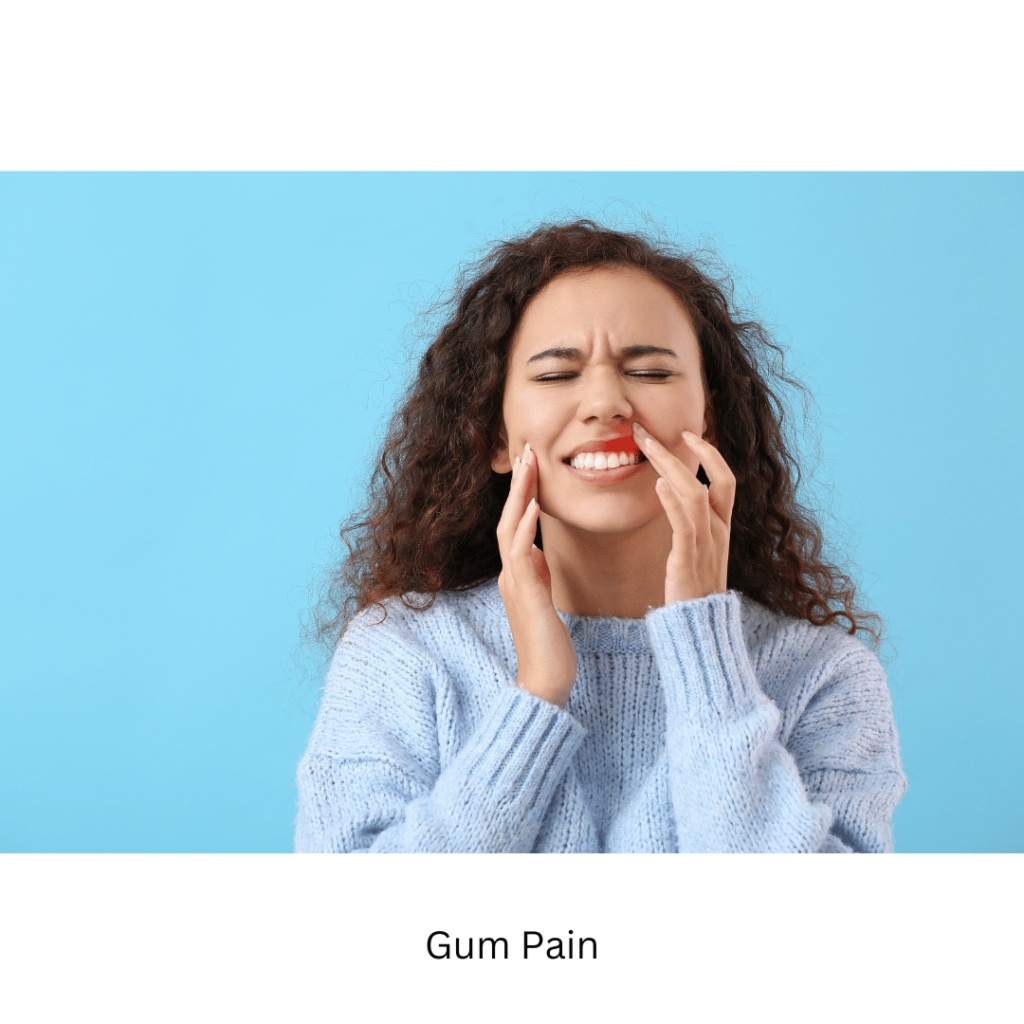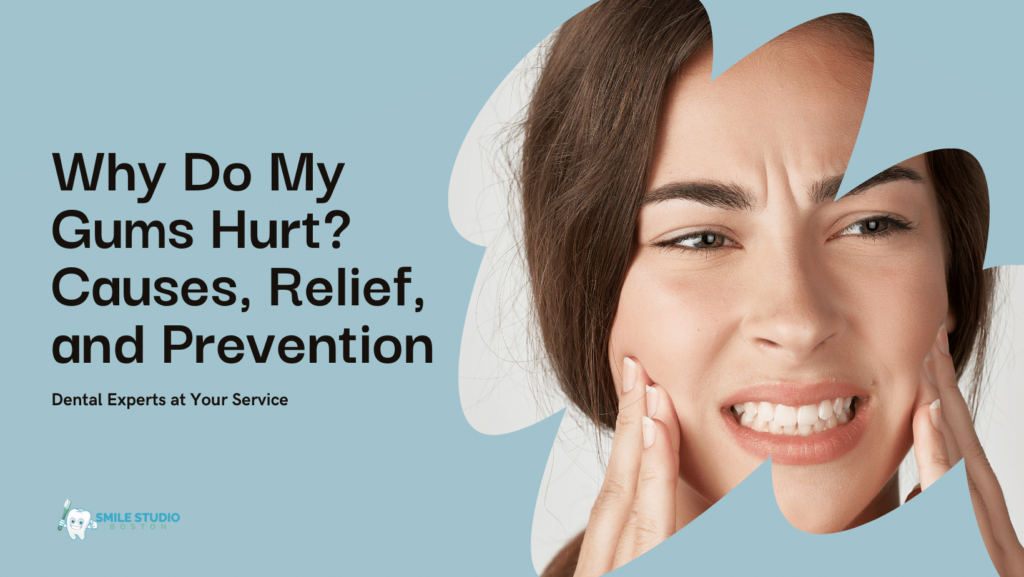Introduction
Why do my gums hurt? This is a question many of us have asked ourselves at some point. Gum pain is a common problem that can be caused by a variety of conditions. It can range from a mild annoyance to a severe discomfort that interferes with eating, speaking, and even sleeping.
Gum pain can be caused by rough brushing, gum disease, canker sores, tobacco use, allergies, burns, hormonal changes, abscessed tooth, dentures, vitamin deficiency, or oral cancer. Each of these causes has its own set of symptoms and treatments.
Understanding why your gums hurt is the first step towards finding relief and maintaining good oral health. In the following sections, we will delve deeper into the causes of gum pain, its accompanying symptoms, and the various treatment options available.
Remember, while this article provides general information, it’s always best to consult with a dental professional if you’re experiencing persistent gum pain. They can provide a proper diagnosis and recommend the most effective treatment for your specific condition.
Why do my gums hurt: Causes of Gum Pain
If you’ve ever wondered, Why do my gums hurt?, you’re not alone. Gum pain is a common issue that can be caused by various factors. Here are some of the most common causes:
1. Rough Brushing and Flossing: Good dental hygiene includes brushing and flossing. However, if you’re overly aggressive, you can irritate and even damage your gums, especially if you’re using a toothbrush with stiff, hard bristles. If your gums hurt after brushing, consider using a brush with soft bristles and be less aggressive with your brushing and flossing.
2. Gum Disease: If your gums are red, swollen, and bleeding, there’s a chance that you have gum disease (periodontal disease). The most common type of gum disease is gingivitis, and a less common but more severe type is periodontitis. Caught early, gingivitis can be reversed with proper oral hygiene. If it isn’t addressed, gingivitis can progress to periodontitis, which could cause tooth loss.
3. Canker Sores and Other Mouth Ulcers: Canker sores — also known as mouth ulcers — are painful, noncontagious sores that appear on the gums and elsewhere in the mouth. The cause of canker sores is unknown, but they’re thought to result from viral or bacterial infection. People with autoimmune diseases are more likely to develop canker sores.
4. Tobacco Use: Smoking tobacco products like cigarettes and cigars can damage your gums. Using smokeless tobacco — such as chewing tobacco or snuff — can cause even more harm. If you use tobacco, this could be why your gums are hurting.
5. Allergic Reaction to Dental Products: Some people have allergic reactions to the ingredients in toothpaste, mouthwash, and other oral hygiene products. This could be the reason why your gums hurt. If you think you might be allergic to a dental hygiene product, try to find out which is responsible for the reaction.
6. Other Causes: Other causes of gum pain include poor dental hygiene, dental cavities, and systemic illnesses. For example, hormone changes related to your period, pregnancy, or menopause can also lead to swollen, painful gums.
Understanding the cause of your gum pain is the first step towards finding relief. If you’re experiencing persistent gum pain, it’s always best to consult with a dental professional for a proper diagnosis and treatment plan.
Symptoms Accompanying Gum Pain
It’s important to note that gum pain is often accompanied by other symptoms. These symptoms can provide clues about the underlying cause of your discomfort. Here are some common symptoms that can accompany gum pain:
1. Bleeding Gums: This is often a sign of gum disease, such as gingivitis or periodontitis. If your gums bleed easily, especially while brushing or flossing, it could be a sign of a problem.
2. Swelling in the Mouth: Swollen gums can be caused by a variety of conditions, including gum disease, canker sores, and infections. The swelling can be localized to one area or spread throughout the mouth.
3. Changes in Appearance of Gums: Healthy gums should be firm and pink. If your gums are red, puffy, or receding, it could be a sign of gum disease.
4. Bad Breath: Persistent bad breath or a bad taste in the mouth can be a sign of gum disease or other oral health problems.
5. Loose Teeth or Pain When Chewing: These can be signs of advanced gum disease or other dental problems.
6. Sensitivity to Hot or Cold: If your teeth or gums are more sensitive to hot or cold temperatures, it could be a sign of gum disease, cavities, or other dental problems.
Remember, these symptoms can be signs of serious oral health problems. If you’re experiencing any of these symptoms along with gum pain, it’s important to consult with a dental professional for a proper diagnosis and treatment.
Treatment and Prevention
If you’re experiencing gum pain and asking yourself, Why do my gums hurt?, it’s important to know that there are various treatments available depending on the underlying cause of your discomfort. Here are some common treatments for different causes of gum pain:
1. Rough Brushing and Flossing: If your gums hurt due to rough brushing and flossing, consider using a brush with soft bristles. They typically clean your teeth as well as one with hard bristles, and they’re recommended by the American Dental Association. Also, be less aggressive with your brushing and flossing.
2. Gum Disease: If you have gum disease, good oral hygiene can help reverse its effects. Brush and floss twice daily and use mouthwash. If gingivitis progresses to periodontitis, which could cause tooth loss, more advanced treatments may be necessary.
3. Canker Sores and Other Mouth Ulcers: Canker sores usually disappear within 14 days. If a mouth ulcer lasts for more than three weeks, consult with your dentist.
4. Tobacco Use: If you use tobacco, this could be why your gums are hurting. To improve your gum health, stop using tobacco products.
5. Allergic Reaction to Dental Products: If you think you might be allergic to a dental hygiene product, try to find out which is responsible for the reaction. Once you identify the product, discontinue using it.
Preventing gum pain is just as important as treating it. Good oral hygiene can help prevent gum pain and other dental issues. This includes brushing at least twice a day, flossing daily, and getting regular dental checkups. These habits can help prevent conditions like gingivitis and periodontitis, which are common causes of gum pain.
Remember, if you’re experiencing persistent gum pain, it’s always best to consult with a dental professional for a proper diagnosis and treatment.
Home Remedies for Sore Gums
If you’re experiencing gum pain and wondering, “Why do my gums hurt?”, there are several home remedies that can provide relief⁴:
1. Saltwater Rinse: Warm 1 cup of water (not to boiling — just warm) and pour into a cool glass. Add 1 tsp. salt to the warm water and mix well. Swish the mixture in your mouth, and then spit it out into a sink when finished (don’t swallow). The salt will help prevent the growth of bacteria in your mouth and decrease the bacteria on your gums, which may be causing the swelling.
2. Compress: Try either a hot or cold compress to help reduce pain. For a hot compress, heat water to a tolerable temperature (not boiling), soak a clean cloth in the hot water, and then squeeze out the excess. Gently press the warm, damp cloth to your face near the area where your gum pain is occurring. For a cold compress, wrap an ice pack in a clean cloth and apply it in the same way.
3. Herbal Poultice: Certain herbs and spices can be turned into home remedies for gum inflammation and pain. Clove powder and Spilanthes are both analgesic (pain-relieving) herbs. An anti-inflammatory powdered herb like turmeric may also help. To use this treatment, mix the powdered herb of choice with a little warm water until you have a paste. Apply the paste directly to your gums until pain subsides, and then rinse your mouth with water.
4. Hydration: Drinking lots of water can help stimulate the production of saliva, which weakens disease-causing bacteria in the mouth⁴.
Remember, these remedies can provide temporary relief, but they don’t replace professional dental care. If your gum pain persists, it’s important to consult with a dental professional.
When to See a Dentist
While home remedies can provide temporary relief, persistent gum pain can be a sign of a more serious condition. If the pain doesn’t subside with home remedies, it’s time to see a dentist.
At Smile Studio Boston, we understand that gum pain can be a sign of various oral health issues, including gum disease, infections, abscesses, and ulcers. Our team, led by Dr. Khushboo Jain, is committed to providing comprehensive dental care to address all aspects of your oral health.

Conclusion
Gum pain, is a common issue that can be caused by various factors. While home remedies can provide temporary relief, it’s important to consult with a dental professional for persistent gum pain. At Smile Studio Boston, we’re here to help you maintain good oral health and ensure your smile is always at its best.
Transform Your Smile Today with SmileStudio!
At SmileStudio, we believe everyone deserves a smile they’re proud to share. Whether you’re looking for routine dental care, cosmetic enhancements, or advanced treatments, our team of experienced professionals is here to guide you every step of the way.
Why Wait? Book Your Appointment Now!
1. Expert Team: Our team of highest rated dentists and dental professionals are committed to providing the highest standard of care. Whether you’re looking for a crown dentist, an implants dentist, or veneers dentist, our team has the expertise to meet your needs.
2. Flexible Payment Options: We believe that everyone should have access to quality dental care. That’s why we offer flexible payment plans to fit your budget.
3. Emergency Dental Care: Dental emergencies don’t always happen during office hours. That’s why we offer emergency dentist services to provide immediate care when you need it most.
4. Walk-In Appointments: We understand that life can be unpredictable. That’s why we offer walk-in appointments at our walk-in accepted dental office to accommodate your busy schedule.
5. Accepting MassHealth: At SmileStudio, we believe in making dental care accessible to everyone. That’s why we’re a dentist that accepts MassHealth, ensuring that you can get the care you need, regardless of your insurance plan
Remember, at SmileStudio, your smile is our priority. We’re here to provide comprehensive dental care tailored to your individual needs.

Take the First Step Towards a Brighter Smile!
Don’t let another day go by without giving your smile the attention it deserves. Contact SmileStudio today to schedule your appointment. Whether you’re a new patient or returning, we’re excited to help you achieve the smile of your dreams.
📞 Call Us: +1 (617) 265-5606
📧 Email Us: smilestudioboston@gmail.com
🌐 Visit Our Website: https://smilestudioboston.com/
📍 Find Us: 1428 Dorchester Ave, Dorchester, MA 02122, United States

SmileStudio – Where Beautiful Smiles Begin. Join us on your journey to a healthier, more radiant smile. Book your appointment now!
FAQs
1. How do I make my gums stop hurting?
You can alleviate gum pain by using home remedies such as rinsing your mouth with warm salt water, using a toothbrush with soft or extra-soft bristles, and using over-the-counter painkillers as directed. However, these are temporary solutions and if the pain persists, it’s important to consult a dentist.
2. Why do my gums all of a sudden hurt?
Sudden gum pain can be caused by a variety of factors including rough brushing and flossing, gum disease, canker sores, tobacco use, allergic reactions to dental products, and other causes like poor dental hygiene, dental cavities, and systemic illnesses.
3. Does gum pain go away?
In many cases, gum pain will go away on its own with proper care and attention. However, persistent gum pain can be a sign of a more serious dental issue, such as periodontitis or a tooth abscess, and should be evaluated by a dental professional.
4. What does gum disease look like?
Gum disease, also known as periodontitis, is characterized by symptoms such as swollen or puffy gums, bright red or dark red gums, gums that bleed easily when you brush or floss, tender gums, and bad breath.
5. What is the fastest way to get rid of a gum infection?
The fastest way to get rid of a gum infection includes maintaining good oral hygiene by brushing at least twice a day, using a medicated mouthwash, flossing after meals, rinsing the mouth with fresh water after meals, and swishing warm salt water around the mouth to help reduce swelling and kill bacteria. However, if the infection persists, it’s important to consult a dentist.
6. Does rubbing salt on gums help?
Yes, salt can help reduce gum inflammation and fight bacteria, thereby promoting healthy gums. Plus, it can be incredibly soothing to a sore or irritated mouth. However, it’s generally recommended to use it in the form of a saltwater rinse rather than applying it directly.
Also Read: Dental Bonding Cost: Affordable Options for Your Smile Makeover
Also Read: See the Difference: Cosmetic Dental Bonding Before and After Photos
Also Read: Exploring Cosmetic Treatments: What is Dental Bonding and How Does It Work?
Also Read: Why Does My Tooth Filling Hurt After Months: 10 Possible Causes
Also Read: How Do Dental Implants Work? Insights into Effective Tooth Replacement
Also Read: Why Bone Graft For Dental Implant is Crucial for a Successful Surgery?


